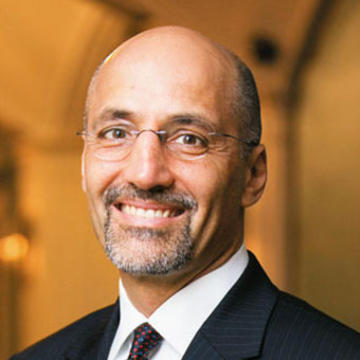From the director: Madeleine Albright—fearless mentor of democracy
The Miller Center's director and CEO writes about the secretary's impact on the world—and on his own life
The United States has lost a historic figure with the passing of Secretary Albright, the original Madame Secretary of State.
Albright was the first woman with that title, but she was so much more than that. She was a passionate and committed patriot, a visionary diplomat, a savvy and intuitive strategist, and a gifted public citizen.
She was uniquely capable of understanding and communicating the real-life consequences of foreign affairs and of America’s indispensable role in advancing and expanding democracy. In my lifetime, no secretary of state has more elegantly and succinctly conveyed the importance of American power and freedom.
Albright helped enlarge democracy following the Cold War and defend it further in recent years.
Her many accomplishments had an immense impact on U.S. foreign policy. She led in designing the post–Cold War international order. She worked to bring peace to Bosnia and later Kosovo—the first wars in Europe after World War II, in many ways previewing the current war in Ukraine. She helped enlarge democracy following the Cold War and defend it further in recent years.
Albright did this in part because she was born in that region (the former Czechoslovakia) and saw the devastation that came to those countries when democracy was taken from them. It was her life’s mission to make sure nothing like that would happen again.
We have been fortunate at the Miller Center at the University of Virginia to have spent considerable time with Secretary Albright. For our Presidential Oral History Program, she committed her own memories of serving under President Carter on his White House NSC staff and under President Clinton as secretary of state and, before that, UN ambassador.
Albright took a leading role in our Presidential Ideas Festival in 2019, an event marking the bicentennial of the University of Virginia, which was founded by our first secretary of state, Thomas Jefferson
She also took a leading role in our Presidential Ideas Festival in 2019, an event marking the bicentennial of the University of Virginia (which was founded by our first secretary of state, Thomas Jefferson). Secretary Albright led the first panel discussion on “The Newer World Order,” in conversation with former National Security Advisor Stephen Hadley and John Dickerson of CBS News. Albright’s role was more significant than her astute, articulate, funny, and self-deprecating style. She was the first speaker to accept our invitation because she believed deeply that public discussion of important ideas was critical to sustaining our democracy.
Three years before that, she joined us when she received the Edward R. Stettinius Jr. Prize for Global Leadership—named for FDR's and Harry Truman's secretary of state (and UVA’s former rector). I had the honor of moderating a conversation with Secretary Albright and Nigerian journalist and editor Oluwatoyosi Ogunseye, recipient of the Presidential Precinct’s Young Leader Award. Secretary Albright was her typical gracious and inspiring self, treating her far-lesser-known counterpart as if she were the real hero being honored, which the secretary felt sincerely.
On a personal level, it is impossible to overstate the extent to which Secretary Albright shaped my career. I first met her in 1990, when I was a graduate student, helping to found (with Steve Grand, a fellow UVA grad) the Civic Education Project, a nonprofit organization that sent advanced graduate students to teach Western approaches to politics, economics, and law to fledgling democracies in Central and Eastern Europe (including Ukraine). Then-professor Albright served on our advisory board and helped select the first set of instructors. She also helped me get my first think-tank job at the Center for National Policy (of which she had served as president). And two years later, she helped me land my first position in government, at the State Department, working for her colleague Jim Steinberg. During the second term for President Clinton, I went to the White House National Security Council staff, as a State Department representative, helping manage the G-7 Summit process. Though I served the president, part of my responsibility was to be particularly sensitive to State Department priorities—that is, Secretary Albright’s priorities.
During my decade at the Brookings Institution and the past seven years at the Miller Center, Madeleine (as we all knew her) remained a mentor. She included me in an intimate, monthly dinner of national security professionals that she hosted at her home, and then switched to Zoom during the pandemic. She regularly encouraged me to share ideas with the group—ever mentoring me, as if I were the 26-year-old graduate student that she first coached decades earlier.
I was far from the only one to view her as a mentor. Madeleine helped to foster the careers of dozens and dozens of other foreign policy professionals. And then there were the thousands of students she taught at Georgetown University over the years. Rather than seeing other academic enterprises as rivals, however, she committed to bringing her spirit to all of them.
The combination of her personal history, her professional acumen, and her human touch were without peer
There will never be another Madeleine Albright. That may sound trite. But the combination of her personal history, her professional acumen, and her human touch were without peer. She had a way of teaching the importance of diplomacy not just in the classroom, but from the seventh floor at Foggy Bottom.
I will miss her and think about her every time a student asks me to help them start their career or launch a project that strengthens democracy.
